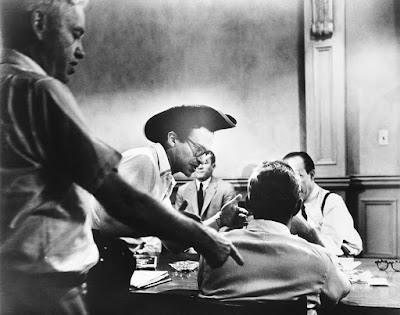Joining two other recent and terrific documentaries -- Hitchcock/Truffaut and De Palma -- that both herald and open up the work of great filmmakers, BY SIDNEY LUMET, the new documentary from Nancy Buirski (who also gave us the excellent Afternoon of a Faun and The Loving Story), reminds us of a wonderful filmmaker who died five years back and whom you might not immediately stick on your list of favorite directors. Watching Ms Buirski's incisive new film should place Lumet up there with the best, while giving you all the reasons why.
Aside from Lumet, there are no other talking heads that ramble on about the man and/or his work. Nor does there need to be. Mr. Lumet, it turns out, was extremely cogent and well-spoken. Not humble, neither was he full of himself. He had, it would seem, an excellent understanding of his abilities, as well as of some of the things that he lacked.
Ms Buirski begins her documentary with Lumet telling a tale of his time in WWII, in Calcutta, on a train, when a group of soldiers swept up a young Indian girl from the station platform, and then passed her around among them to be raped. Lumet is dumbstruck and wonders what he should do. We leave this tale in mid-stream and return to it only at film's end.
In between, Lumet talks of his family life, his time as a child actor (at left), his difficult father, and a contract with (I believe) MGM that somehow hinged on another young actor, Freddie Bartholomew. We learn a lot about his early years as a television director -- and in passing also learn that Yul Brynner, too, in his early years, was a very fine director! It will not surprise movie fans to learn that justice and the search for same is a hallmark, probably the main theme, of Lumet's work. (That's Sean Connery, below, in one of Lumet's least-seen and -appreciated movies, The Hill.)
And yet, what a versatile director he was in terms of projects (some of which he chose, others that were chosen for him). As we view scene after scene, from one film after another, I suspect that you, as I did I, will exclaim under your breath: "Oh, my god: He made that movie, too?" (During the final credit sequence, we get a list of all of the films directed by Lumet, and it's a humdinger: long and mostly good, even if it leaves out the excellent work he did for television.)
From 12 Angry Men (his first film, above) through The Verdict to his penultimate movie Find Me Guilty, Lumet was often in the courtroom, though just as often perhaps in the police station (Serpico, Prince of the City, and Q&A) and most definitely on the street a lot -- as in what many consider his best movie, Dog Day Afternoon. (How amazingly current this one seems, as much now and when it was made. That's Sidney, below, with his star Al Pacino.) What Lumet says about New York City, its streets and its ravishing winter light, is -- as so much else he tells us -- pointed, well-said, and true.
By the time this amazing and wonderful doc comes to a close, you will understand much more fully, thanks especially to that World War II/Calcutta reminiscence, why Mr. Lumet proved so interested in justice and the search for it against so many odds. (Yes, that's Peter Finch, in another of Lumet's memorable movies, Network, below)












































